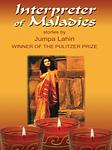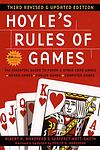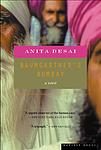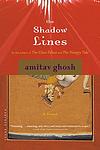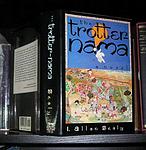The Indian Fiction Top 25
This is one of the 284 lists we use to generate our main The Greatest Books list.
-
Love And Longing In Bombay by Vikram Chandra
"Love And Longing In Bombay" is a collection of five interconnected stories set in the bustling city of Bombay. Each story explores themes of love, loss, and longing, as characters navigate their way through the complexities of relationships and the challenges of modern life. From a detective investigating a mysterious disappearance to a struggling actor caught in a web of deceit, these stories offer a glimpse into the diverse lives and emotions of Bombay's inhabitants. With richly drawn characters and evocative descriptions of the city, the book captures the essence of Bombay and delves into the universal experiences of love and longing.
-
The Fig Tree by Aubrey Menen
"The Fig Tree" by Aubrey Menen is a thought-provoking novel that delves into the complexities of identity and self-discovery. Set in India during the country's struggle for independence, the story follows the journey of a young man named Raman, who embarks on a quest to find his true purpose in life. Through vivid descriptions and rich character development, the novel explores themes of cultural clash, spiritual enlightenment, and the search for personal fulfillment. With its lyrical prose and insightful reflections, "The Fig Tree" offers a captivating exploration of the human condition and the universal quest for meaning.
-
Tales From Firozhsha Baug by Rohinton Mistry
"Tales From Firozhsha Baug" is a collection of interconnected stories set in a Mumbai apartment complex. Through the lives of its diverse residents, the book explores themes of family, identity, and the complexities of urban life in India. With a blend of humor, compassion, and keen observation, the stories shed light on the struggles, dreams, and resilience of ordinary people, capturing the essence of a vibrant community in a rapidly changing city.
-
Interpreter of Maladies by Jhumpa Lahiri
"Interpreter of Maladies" is a collection of nine short stories, each exploring different aspects of life, love, and identity. The stories are set in both India and America, and the characters often grapple with issues of cultural identity, displacement, and the complexities of relationships. Themes like marital issues, communication breakdowns, and the struggle to fit in are prevalent throughout the stories, offering a poignant and nuanced glimpse into the human experience.
-
The Impressionist by Hari Kunzru
"The Impressionist" is a captivating novel that follows the life of a mixed-race boy named Pran Nath. Born in India during the British Raj era, Pran's fate takes a dramatic turn when he is mistaken for the son of a wealthy British aristocrat. As he navigates through various identities and encounters, Pran's journey becomes a reflection of the complexities of race, class, and colonialism. With vivid prose and a keen exploration of identity, this book offers a thought-provoking exploration of one man's quest for belonging and self-discovery in a rapidly changing world.
-
All about H. Hatterr by G. V. Desani
This novel is a unique blend of Eastern philosophy and Western literary technique, following the adventures of its protagonist, a British-educated Indian everyman, as he navigates the complexities of life. The narrative is filled with humor, satire, and linguistic playfulness, as the protagonist interacts with various eccentric characters and experiences numerous absurd situations. The book is a critique of both British colonialism and traditional Indian society, offering a distinctive and insightful perspective on the human condition.
-
The Golden Gate by Vikram Seth
Set in the 1980s, the novel follows the life of a group of friends living in San Francisco. The protagonist, a successful yet lonely executive, is persuaded by his former girlfriend to place a personal ad, leading to a relationship with a musician. The narrative delves into their relationship, their friends' lives, and the various complications they face, including issues of love, friendship, sexuality, and death. The unique aspect of this book is that it is written entirely in verse, specifically in sonnet form.
-
Midnight's Children by Salman Rushdie
The novel tells the story of Saleem Sinai, who was born at the exact moment when India gained its independence. As a result, he shares a mystical connection with other children born at the same time, all of whom possess unique, magical abilities. As Saleem grows up, his life mirrors the political and cultural changes happening in his country, from the partition of India and Pakistan, to the Bangladesh War of Independence. The story is a blend of historical fiction and magical realism, exploring themes of identity, fate, and the power of storytelling.
-
Swami and Friends by R. K. Narayan
Set in the fictional town of Malgudi in South India, the book follows the story of a ten-year-old boy named Swami and his adventures with his friends. The narrative encapsulates the trials and tribulations of school life, family relationships, and friendships in a traditional Indian context. The book is a charming exploration of a child's life in a small town, filled with humor and poignant moments.
-
Coolie by Mulk Raj Anand
"Coolie" is a poignant and powerful novel that delves into the life of Munoo, a young boy from a small village in India who is forced into a life of labor as a coolie. Set during the British colonial era, the story explores themes of exploitation, poverty, and the harsh realities faced by the lower classes. Munoo's journey takes him from his village to bustling cities, encountering both cruelty and kindness along the way, ultimately shedding light on the injustices of the time.
-
Nectar in a Sieve by Kamala Markandaya
"Nectar in a Sieve" is a tale of an Indian peasant woman named Rukmani who endures the hardships of rural poverty, natural disasters, and personal tragedy, while trying to raise her children and maintain her marriage. The book explores themes of love, hope, and the strength of the human spirit against the backdrop of a rapidly changing India. Despite the constant struggles, Rukmani never loses her faith and hope, symbolizing the resilience and strength of ordinary people in the face of adversity.
-
Baumgartner’s Bombay by Anita Desai
In "Baumgartner's Bombay" by Anita Desai, the story revolves around Hugo Baumgartner, a German Jew who fled to India during World War II. Set in Bombay, the novel explores the themes of identity, displacement, and the search for belonging. As the narrative unfolds, Hugo's life becomes entwined with that of the city's street children, leading to a poignant and thought-provoking exploration of love, loss, and the complexities of human connections.
-
The Shadow Lines by Amitav Ghosh
"The Shadow Lines" is a novel that explores themes of memory, family, and national identity through the eyes of a young boy and his experiences growing up in Calcutta, India. The narrative is framed by two major historical events: the 1964 Dhaka Riots and the 1942 World War II. The protagonist's relationships with his family and his personal experiences are juxtaposed with these events, highlighting the complexities of identity, memory, and the lasting impacts of historical events on individual lives. The novel also delves into the arbitrary nature of national borders and the shadow lines they draw between people and their histories.
-
The Trotternama by I Allan Sealy
"The Trotternama" is a mesmerizing tale that weaves together the lives of various characters in a small Indian village. Set against the backdrop of political and social changes in post-independence India, the story explores themes of identity, love, and the search for meaning. With lyrical prose and rich descriptions, the author takes readers on a journey through the intricacies of human relationships and the complexities of a rapidly changing society.
-
The Great Indian Novel by Shashi Tharoor
This book is a satirical take on Indian politics and history, cleverly intertwined with characters and events from the epic Mahabharata. The narrative presents a parallel between the two, with the characters in the novel mirroring significant figures from India's political scene during the Independence and post-Independence era. The book is a humorous yet thought-provoking critique of Indian society and politics, offering a unique blend of myth, history, and satire.
-
When Dreams Travel by Githa Hariharan
"When Dreams Travel" is a thought-provoking novel that explores the complex themes of identity, memory, and the power of dreams. Set in India, the story follows the lives of three individuals from different backgrounds who are brought together by a shared dream. As they embark on a journey to uncover the truth behind their dreams, they are confronted with their own pasts and the interconnectedness of their lives. Hariharan's lyrical prose and vivid descriptions create a captivating narrative that delves into the depths of the human psyche and the universal longing for self-discovery.
-
Raavan & Eddie by Kiran Nagarkar
"Raavan & Eddie" is a captivating coming-of-age story set in the bustling streets of Mumbai. The book follows the lives of two young boys, Raavan and Eddie, who grow up in the same chawl and share a unique bond. As they navigate the challenges of poverty, family dynamics, and societal expectations, their friendship is tested, and their dreams take them on unexpected paths. With humor, heart, and a vivid depiction of Mumbai's vibrant culture, this novel explores themes of identity, love, and the pursuit of dreams in a rapidly changing world.
-
That Long Silence by Shashi Deshpande
In this thought-provoking novel, a woman named Jaya struggles to find her identity and voice in a patriarchal society. Through introspection and reflection on her past, she grapples with the expectations placed upon her as a wife, mother, and daughter-in-law. As she navigates the complexities of her relationships and confronts societal norms, Jaya embarks on a journey of self-discovery and liberation, ultimately finding the courage to break her long silence and assert her individuality.
-
The God of Small Things by Arundhati Roy
This novel is a poignant tale of fraternal twins, a boy and a girl, who navigate through their childhood in Kerala, India, amidst a backdrop of political unrest and societal norms. The story, set in 1969, explores the complexities of their family's history and the tragic events that shape their lives. Their mother's transgression of caste and societal norms by having an affair with an untouchable leads to disastrous consequences, revealing the oppressive nature of the caste system and the destructive power of forbidden love. The novel also delves into themes of postcolonial identity, gender roles, and the lingering effects of trauma.
-
Kanthapura by Raja Rao
"Kanthapura" is a powerful novel that tells the story of a small South Indian village as it becomes embroiled in the struggle for independence from British rule. Through the eyes of a young woman named Moorthy, the reader witnesses the transformation of the village and its people as they are inspired by the teachings of Mahatma Gandhi and join the fight for freedom. The novel explores themes of unity, sacrifice, and the power of nonviolent resistance, offering a poignant portrayal of the impact of colonialism on rural communities and the strength of the human spirit.
-
Delhi by Khushwant Singh
"Delhi" by Khushwant Singh is a captivating exploration of the city's rich history, culture, and people. Through vivid anecdotes and personal experiences, the author paints a vivid picture of Delhi's transformation from ancient times to the present day. From the Mughal era to British rule, and the struggles of Partition, Singh delves into the city's tumultuous past while highlighting its enduring charm. With a blend of wit and nostalgia, this book offers readers a delightful journey through the vibrant streets, monuments, and diverse communities that make up the heart of Delhi.
-
Old Cypress by Nisha Da Cunha
"Old Cypress" is a poignant and thought-provoking novel that explores the complexities of family, identity, and cultural heritage. Set in a small coastal town, the story follows the life of a young woman who embarks on a journey of self-discovery after the sudden death of her grandmother. Through vivid descriptions and evocative storytelling, the book delves into themes of love, loss, and the power of nature, ultimately leaving readers with a profound sense of connection to the past and the importance of embracing one's roots.
-
The Room On The Roof by Ruskin Bond
"The Room On The Roof" is a coming-of-age story set in Dehradun, India. The protagonist, Rusty, is a sixteen-year-old Anglo-Indian boy who feels suffocated by the rules and expectations of his guardian. Seeking freedom and independence, he befriends a group of Indian boys and experiences the joys and challenges of adolescence. Through his adventures, Rusty learns valuable lessons about friendship, love, and the importance of staying true to oneself.
-
The River Sutra by Gita Mehta
"The River Sutra" by Gita Mehta is a captivating novel that explores the intertwining lives of various characters along the sacred river Narmada in India. Through vivid storytelling and rich descriptions, the book delves into themes of spirituality, love, and the search for meaning in life. As the characters embark on journeys of self-discovery, the river serves as a powerful metaphor for the flow of life and the interconnectedness of all beings. With its lyrical prose and thought-provoking narrative, "The River Sutra" offers a profound exploration of the human experience and the timeless wisdom of ancient traditions.
-
The Devil In The Dustbin by Indi Rana
"The Devil In The Dustbin" is a gripping psychological thriller that follows the story of a troubled young woman named Alice who discovers a mysterious diary hidden in her attic. As she delves deeper into its pages, she becomes increasingly obsessed with solving the dark secrets it holds, leading her on a dangerous journey that blurs the line between reality and imagination. With each twist and turn, Alice's sanity is tested, and the truth becomes more elusive, leaving readers on the edge of their seats until the shocking climax.
Jerry Pinto, Indian poet and novelist, 25 Books
This is a list of the top 25 Indian fiction books by Jerry Pinto. Jerry is a Mumbai-based Indian-English poet, novelist, short story writer, translator, as well as journalist. Pinto's works include Helen: The Life and Times of an H-Bomb, which won the Best Book on Cinema Award at the 54th National Film Awards, Surviving Women and Asylum and Other Poems.
Added 6 months ago.
This list has a weight of 30%. To learn more about what this means please visit the Rankings page.
Here is a list of what is decreasing the importance of this list:
- Voters: 1 person voted
- List: only covers 1 specific country
If you think this is incorrect please e-mail us at [email protected].


